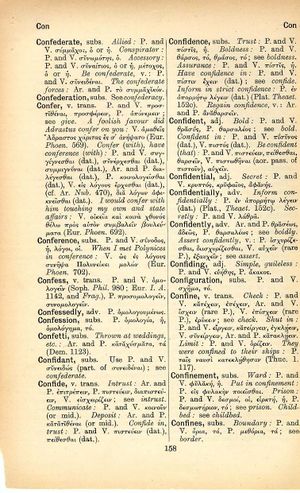confine: Difference between revisions
From LSJ
Οὐ χρὴ φέρειν τὰ πρόσθεν ἐν μνήμῃ κακά → Mala pristina haud oportet ferre in memoria → Du darfst nicht im Gedächtnis tragen früheres Leid
m (Text replacement - "(|thumb)\n(\|link=)" to "$1$2") |
m (Woodhouse1 replacement) |
||
| Line 1: | Line 1: | ||
{{Woodhouse1 | {{Woodhouse1 | ||
|Text=[[File:woodhouse_158.jpg|thumb|link={{filepath:woodhouse_158.jpg}}]] | |Text=[[File:woodhouse_158.jpg|thumb|link={{filepath:woodhouse_158.jpg}}]] | ||
===verb transitive=== | |||
[[check]]: [[prose|P.]] and [[verse|V.]] [[κατέχειν]], [[ἐπέχειν]], [[Aristophanes|Ar.]] and [[verse|V.]] [[ἴσχειν]] (rare [[prose|P.]]), [[verse|V.]] [[ἐπίσχειν]] (rare [[prose|P.]]), [[ἐρύκειν]]; see [[check]]. | |||
[[shut in]]: [[prose|P.]] and [[verse|V.]] [[εἴργειν]], [[κατείργειν]], [[ἐγκλῄειν]], [[verse|V.]] [[συνείργειν]], [[Aristophanes|Ar.]] and [[prose|P.]] [[κατακλῄειν]]. | |||
[[limit]]: [[prose|P.]] and [[verse|V.]] [[ὁρίζειν]]. | |||
[[they were confined to their ships]]: [[prose|P.]] [[ταῖς ναυσὶ κατεκλῄθησαν]] ([[Thucydides|Thuc.]] 1. 117). | |||
}} | }} | ||
{{Gaffiot | {{Gaffiot | ||
Revision as of 08:52, 20 May 2020
English > Greek (Woodhouse)
verb transitive
check: P. and V. κατέχειν, ἐπέχειν, Ar. and V. ἴσχειν (rare P.), V. ἐπίσχειν (rare P.), ἐρύκειν; see check.
shut in: P. and V. εἴργειν, κατείργειν, ἐγκλῄειν, V. συνείργειν, Ar. and P. κατακλῄειν.
they were confined to their ships: P. ταῖς ναυσὶ κατεκλῄθησαν (Thuc. 1. 117).
Latin > French (Gaffiot 2016)
cōnfīnĕ, is, n.,
1 partie qui avoisine, voisinage : Luc. 6, 649 ; Val. Flacc. 6, 374
2 = homœoteleuton : Carm. fig. 100.
Latin > English
confine confinis N N :: boundary, border, border-line; confine, neighborhood (L+S)

